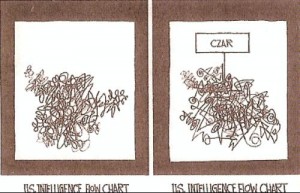
I have begun drafting my portion of the new Handbook of Intelligence Studies (Routledge, 2013), it is a chapter early on entitled “The Craft of Intelligence.” I pick up where Allen Dulles and Sherman Kent left off. My graphic on Intelligence Maturity captures the essence of my thinking at the strategic level, but of course there is more to come, including the desperate need to restore integrity to all that we do.
In 1988 I ghost-wrote for the Commandant of the Marine Corps an article that he enhanced and signed, “Global Intelligence Challenges in the 1990's.” At that time my focus was on the difference between the conventional threat and the emerging unconventional threat.
Now my focus is on the purpose and process of intelligence as decision-support. We must — we will — move from secret intelligence for the few to open intelligence for the many; from expensive centralized largely worthless intelligence to free and low-cost distributed intelligence relevant to every person at every level on every issue; from intelligence as window-dressing for channeling $80 billion a year to banks and corporations, to intelligence as an integral element of every aspect of a Smart Nation.
Today Owl sent me a link to an article, Philip E. Tetlock and Barabara A Mellers, “Intelligent Management of Intelligence Agencies,” American Psychologist, 2011, pp. 1-12. I respect Owl, so I printed it and read it twice.
This article is completely out of touch with reality and the authors have not bothered to familiarize themselves with the literatures pertinent to their endeavor. Out of 89 cited sources 12 are non-intelligence-related prior publications of the lead author, 1 is a prior publication of the second author, and 11 are ostensibly about intelligence but truly marginal selections. So 12% sources on the subject, 13% self-citation, and 75% escoteric psycho-babble irrelevant to the actual challenge. As an intelligence professional, I am offended that two ostensibly erudite individuals would dare to publish this trype without even a semblance of understanding of the subject under discussion.
See Also:
Robert Steele: The Craft of Intelligence – OLD vs. NEW
Here are a few comments and additional links:










